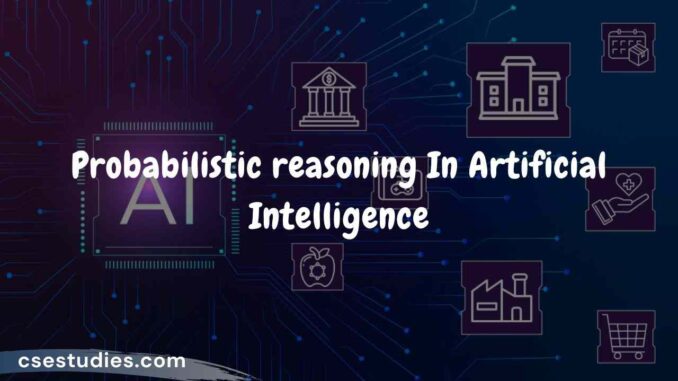
Probabilistic reasoning is a branch of artificial intelligence (AI) that deals with uncertain information and incorporates probability theory to make decisions, draw inferences, and model real-world scenarios. It provides a framework for reasoning and decision-making under uncertainty by assigning probabilities to various events or hypotheses.
The key aspects and components of probabilistic reasoning:
- Probability Theory:
- Probability theory provides a mathematical framework for quantifying uncertainty and reasoning about random events.
- It assigns a probability value between 0 and 1 to each event, representing the likelihood of its occurrence.
- Probability theory defines rules for combining probabilities, such as the product rule and the sum rule, which are used in probabilistic reasoning to update and manipulate probabilities based on evidence and prior knowledge.
- Bayesian Inference:
- Bayesian inference is a fundamental technique in probabilistic reasoning that allows for updating beliefs based on new evidence.
- It follows the principles of Bayes’ theorem, which states that the posterior probability of a hypothesis given the observed evidence is proportional to the prior probability of the hypothesis multiplied by the likelihood of the evidence given the hypothesis.
- Bayesian inference provides a principled way to incorporate new information, update beliefs, and revise probabilities based on observed data.
- Bayesian Networks:
- Bayesian networks, also known as probabilistic graphical models, are graphical representations of probabilistic relationships among variables.
- They use directed acyclic graphs to model dependencies between variables and capture cause-and-effect relationships.
- Bayesian networks combine probability theory and graph theory to represent and reason about uncertain knowledge in a compact and intuitive manner.
- These networks enable efficient probabilistic inference and decision-making by leveraging the conditional independence properties of the variables.
- Markov Decision Processes:
- Markov decision processes (MDPs) are mathematical models used to model decision-making under uncertainty in dynamic environments.
- MDPs combine the principles of probability theory and decision theory to optimize actions in a sequential decision-making process.
- MDPs model the state transitions, rewards, and decision policies to determine the optimal sequence of actions that maximize long-term expected rewards.
- Hidden Markov Models:
- Hidden Markov models (HMMs) are probabilistic models widely used in applications involving sequential data, such as speech recognition and natural language processing.
- HMMs assume that there is an underlying, unobservable (hidden) process that generates a sequence of observable events.
- By modeling the transition probabilities between hidden states and the emission probabilities of observable events, HMMs allow for inference of the most likely sequence of hidden states given the observed data.
Probabilistic reasoning enables AI systems to handle uncertain and incomplete information, make decisions based on probabilities, and draw inferences from available evidence. It finds applications in various domains, including machine learning, data analysis, natural language processing, robotics, and decision support systems. By incorporating probabilistic models and techniques, AI systems can handle real-world complexity, reason under uncertainty, and make informed decisions based on probabilistic evidence.